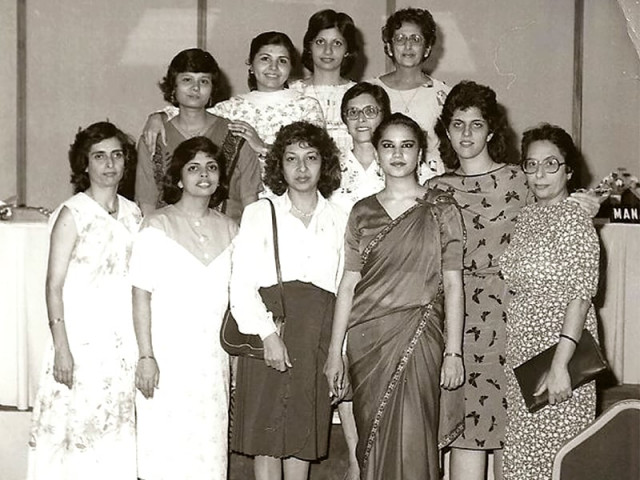Doorway to the boss: The Secretary
Behind her desk, she sees all, knows all but is rarely ever heard.

1979: The Executive Committee for Distinguished Secretaries Society of Pakistan.
But life is not an episode of Mad Men and sexy stereotypes do no justice to the women (and men) who were regarded as the highest vertebra in the backbone of a company. The profession has changed with computer technology, good secretaries are hard to come by today and perhaps it is not considered a career path any more. Even the word ‘secretary’ has been replaced with the more politically correct ‘administrative or office assistant’. But as some of the old guard will tell you, they still take immense pride and prefer being called a secretary.
“[As a child] I remember Jacqueline being the first one to walk into [my father’s] office,” says Bilal Hameed, a private textile businessman in Lahore. “She was this super-organised, stern woman. You know, the kind you can never imagine [as ever once being] young.” Jacqueline worked with his father for nearly 24 years but once she retired, Bilal says his father never found a replacement who could fill her shoes. “They kept coming and going.”
In Karachi, Pakistan’s financial capital, Parsi and Christian secretaries were and still are regarded as having set the gold standard. Some of them are still around but several factors have contributed to a drain on the profession. Aside from retirement and death, the general exodus of this non-Muslim demographic in reaction to the slow creep of ‘Islamisation’ from Ziaul Haq’s time has had the corollary effect. And thus, while women such as Maharukh Bhiladwala, Goretti Ali and Caroline Charles, all secretaries with decades of experience, still rule the carpeted corridors of multinational companies few of their caliber remain.
Limited options
“When we entered the workforce, the options for women were limited. You could either be a teacher, nurse or a secretary,” says Goretti Ali, who has been a secretary for 34 years. Since teaching did not pay well and being a nurse required a different kind of commitment, she chose to follow her sister’s footsteps and took her first job as a typist at the age of 17. Training involved a few months of typing and shorthand classes after school and a lot of learning on the job. During the 1970s, many women went to a school run by the St Patrick’s social welfare society on the grounds of the cathedral.
Today a good secretary can ask for as much as Rs75,000 but Mahrukh Bhiladwala used to go home with Rs80 per month 47 years ago. That is by no means a measure of success, for today she is the president of the Distinguished Secretaries Society of Pakistan, a voluntary organisation that provides professional support to secretarial members across Pakistan.

Inevitably though, as other professions such as architecture, human resources and banking opened up, the charm of a secretarial job began to fade. “Back then, there was a lot of glamour and a certain persona associated with being a top executive’s secretary,” she says. “Now young girls don’t want to [take] a line which is by nature a subordinate profession — where you always have to report to someone else.” They would rather be in jobs where someday they can be the boss.
The making of a good secretary

1978: Presenting certificates of attendance to the Pakistan secretarial delegation in Singapore.
Typing, maintaining a filing system, taking shorthand, and answering the telephone were the basic skills that every secretary needed when Goretti Ali entered the profession during the 70s.
But naturally, it spirals out to include making travel arrangements, or even, in some cases booking wedding halls or finding a vet for the boss’s pet.
Scheduling the boss’s time is one of the biggest duties. “You need to have enough of a mind to be able to tell the real [deal] from the chaff,” adds Bhiladwala, stressing the need for a firm but pleasant demeanour. “Everyone wants to see the boss — it is your job to decide whether this person is worth your boss’s time.”
But with this power comes greater responsibility. The former head of an advertising firm recalled the loss of an eight-million-rupee account 16 years ago because the secretary flubbed up on the day’s list. He went out to lunch and she forgot that a major ice-cream company’s executives were slotted in for a visit.
Good people skills and the ability to communicate properly with your boss were the bedrock of the profession as was the understanding that as a secretary you were the “the face of the organisation” as Ali puts it to emphasise what they considered one of their weightiest responsibilities.
“Patience is the biggest aspect of it,” says Saleem Khan, a private businessman in Karachi. “There are a lot of small details and seemingly unimportant tasks that they have to take care of, but if you can do that with a smile, you are perfect for the job.”
A good secretary also has stamina. For many, a regular day starts at 7:30 am and ends around 7 pm. “The concept of a 9 to 5 day is outdated,” says Biladwala. “There is no such thing.”
But it can also be a nerve-wracking job in which there is no room for histrionics no matter how badly your day has gone. Bhiladwala’s formula was a restrained one: When a day gets out of control, I just close the door, jump up and down for a few minutes and mumble a few things. If you [happen to] walk into the room two minutes later, you will never be able to figure what I was doing.
Evolution of the job

1995: Goretti Ali during the early years when most offices were transitioning to computers.
Before computers invaded the office, the typewriter was a secretary’s best friend but also her worst enemy at times. “I remember the days when we sat with six, seven sheets of carbon paper and typed away, as the keys went tick-tick and the carriage went clackety-clack,” says Bhiladwala. “And God forbid, if there were calculations involved…. you had to sit across a person who read off the numbers from a paper while you ticked [them off].”
Goretti Ali recalls how excited they were when they first found out that they could save a line on the electric typewriter.
As the world became more tech-savvy, the women invested in computer classes and gradually mastered the device. From manually memorizing the commands of the early disk operating systems to learning to create immaculate spreadsheets on Microsoft Excel, these women struggled but learnt all the skills needed to stay relevant in their field.
As bosses started to manage their own schedules with the help of laptops and handheld devices, the nature of the secretary’s job changed. “Now a secretary can’t be just a secretary,” emphasises Caroline Charles. “She has to know a little bit of finance, HR and administrative work if she wants to secure her job.” She is one of the relatively younger entrants to the profession and her work entails all of the above.
Not just the job, but the way they dressed for it also changed with time. Previously they enjoyed a reputation for being sharply dressed in all kinds of clothes from trousers and skirts to shalwar qameez. “Things changed post-9/11,” says Ali. “It was better to gel in than to stand out.” She completely switched to shalwar kameez but cites the deteriorating conditions in Karachi as the main reason. “These days the city can shut down any time within minutes. You have no choice but to walk down the street and hail a rickshaw, and doing that in a skirt is just asking for trouble.”
And yet there are women like Bhiladwala who agrees with the potential risks of wearing Western attire but who has adamantly stuck to her linen trousers and floral tops.
The ups and downs
The salary ceiling has been one of the biggest downers in the profession. A beginner can make anything between Rs2,000 to Rs25,000. However, once a secretary reaches a certain rank and pay scale, it is impossible to grow any further.
“It is just the nature of the job,” says Bhiladwala. “You might be handling the work of a manager, but you will always be a secretary and that automatically puts a barrier on how much you earn.” Her case is an exceptional one: she became a managing director for one of the companies that had initially taken her on as a secretary. When the company dissolved a few years later, though, she had to rejoin the secretarial market at a much lower pay scale.
Sexual harassment is a constant risk and for most women is an instant deal breaker. They will walk out, which is hardly justice for them but the only option. The unwanted attention ranges from men making suggestive remarks, to slipping them telephone numbers and making physical advances. “It is the absolute worst thing for your confidence,” says Ali. “You start to second-guess yourself and spend an endless amount of time wondering if you gave off the wrong vibes. Sometimes I wish we could live life backwards; I would have handled situations so much better.”

Working for women bosses does not necessarily make it better — that terrain comes with another set of challenges. They are generally more aggressive and keen to emphasise their authority, something that Bhiladwala explains is the outcome of trying to overcome the default perception that women are the weaker sex. “A woman has to work twice as hard to prove that she is half as good as a man,” she says. “Men can go around slapping each other on the back and get to work when it’s needed. If a woman does that, she is perceived as frivolous. So she has to be doubly vigilant and doubly authoritative, [but] which if taken too far, becomes arrogance.”
National brand ambassadors
Secretaries, as many of them like to be called, have done a fair bit of work on the international scene. Pakistan will be hosting the next congress, a bi-yearly congregation of secretaries across the Asia-Pacific region in September 2013. The country is a member of the Association of Secretaries and Administrative Professionals in Asia Pacific, an international body of 15 member countries. A five-day conference will host 120 foreign delegates, said Bhalidwala, who is the current president of association and nervous and excited in equal measure about the event.
“It is challenging because of the security situation,” she admits. “But that is why it is equally important too. The world has a certain perception of Pakistan and we want to change that by projecting our working women at the forefront.” The conference will host speakers to address workplace issues and provide an opportunity for secretaries from different countries to network and exchange ideas. The last congress hosted by Pakistan was in 1990.
Future
The supply and demand for secretaries is tenuous. According to an advisor for a media group, he has noted high demand in the Punjab where the old merchant class ‘seths’ still need someone to do their correspondence in English. Their children, however, who take over the reins of business with formal degrees do not need this kind of help.
“Once I took over things, I never really felt the need for one,” says textile businessman Bilal Hameed, who has been managing his father’s enterprise for the last five years. “Everything is so… convenient now. You check your own emails, plan meetings according to your schedule. You don’t really need another person to do it for you.”
If the decline in demand is linked to the rise of the cloud-computing executive, the supply is shrinking because of better-paid jobs and a change in perception for the profession. The only good news is that Ali and Bhiladwala feel it will always be in safe hands, especially now that people join it out of choice, not because they have no other choice.
Maharukh Bhiladwala
President of Distinguished Secretaries Society of Pakistan and Association of Secretaries and Administrative Professionals in Asia Pacific. She has been in the secretarial profession for the past 47 years.
Published in The Express Tribune, Sunday Magazine, August 25th, 2013.
Like Express Tribune Magazine on Facebook, follow @ETribuneMag on Twitter to stay informed and join the conversation.


















COMMENTS
Comments are moderated and generally will be posted if they are on-topic and not abusive.
For more information, please see our Comments FAQ